#Japanese martyrs
Explore tagged Tumblr posts
Text


"At the centre of their lives was only their faith in God and they kept no other concern in their hearts outside of that."
~From The Pass of The Virgin, History of the Christian Martyrs of Tsuwano
Amicinagai.com
(Images via H.M. Magazine)
#Christian#Japanese martyrs#Amicinagai#The Pass of the Virgin#center of their lives was faith in God
9 notes
·
View notes
Text


"they like the red" is such an ironic statement considering, well, everything
#LOOK WHAT RED DID TO YOU BOTH#the martyrs of scuderia ferrari#in my sebchal era#charles leclerc#formula 1#sebastian vettel#scuderia ferrari#sebchal#f1#ferrari#japanese gp 2023
64 notes
·
View notes
Text
“It is not pain that hovers about his straining chest, but some flicker of melancholy pleasure like music. Were it not for the arrows with their shafts deeply sunk into his left armpit and right side, he would seek more a Roman athlete testing from fatigue, leaning against a dusky tree in a garden.
The arrows have eaten into the tense, fragrant, youthful flesh and are about to consume his body from within with flames of supreme agony and ecstasy. But there is no flowing blood, not yet the host of arrows seen in other pictures of Sebastian’s martyrdom.”
Confessions of a Mask, Yukio Mishima (1949)
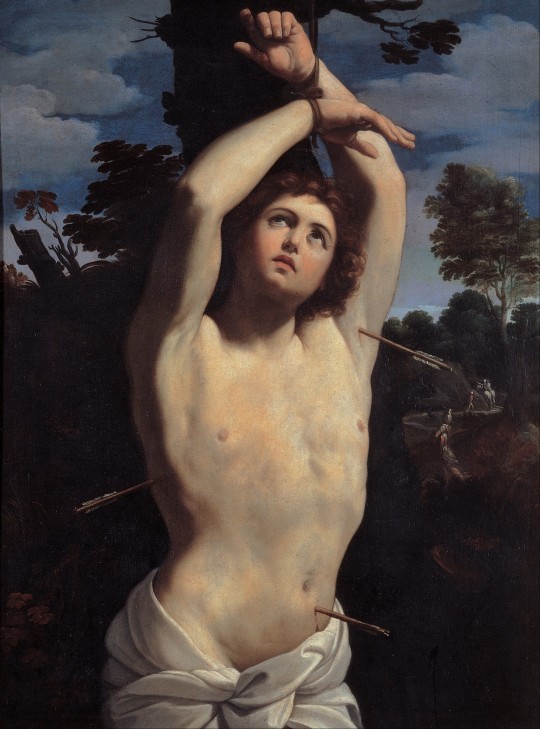
Saint Sebastian by Guido Reni (1625)
#st sebastian#saint sebastian#martyr#martyrs#yukio mishima#japanese literature#15th century#15th century art#literature quotes#literature#book#books#book quotes#japanese#italian#italian art#italian renaissance#art#painting#biblical painting#biblical art#christian imagery#christianity#catholic#catholic art
3 notes
·
View notes
Text
feeling so righteous about having been calling ezio salò saint sebastianesque based on vibes only for months after actually finding out who saint sebastian even was today
3 notes
·
View notes
Text
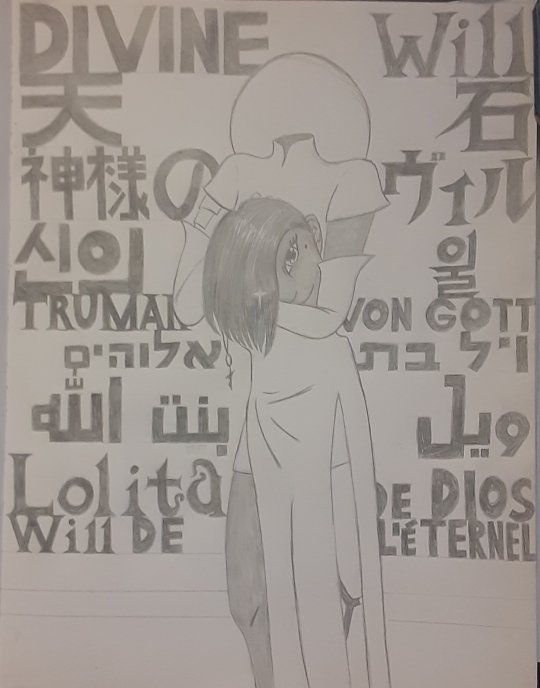
Shí Will Bea Trueman as a Cephalophore [i.e. a beheaded Catholic saint carrying their own head].
Fun fact, not only is martyrdom [i.e. giving your life for what you believe in] the highest possible honor, but in Catholic theology, martyrdom serves the purpose on Earth as Purgatory does after death. The purification of all venial sins, and so martyrs go straight to Paradise as there's nothing to purify before getting there.
Various title translations in the back.
WIP.
I'm contemplating a book cover, tbph.
Read DIVINE WILL here: https://t.co/HXlBqr28OK
#original character#superheroine#original story#magical girl#dark fantasy#martyrs#sekaikei#hopepunk#nobelbright#translation#qipaodress#sketch#pencil#book cover#japanese#korean#chinese#arabic#hebrew#german#spanish#french#sweet smile#prosthetics#halo
4 notes
·
View notes
Text
Making $10 million by selling books teaching people how to get rid of books is actually very in line with American ideology.
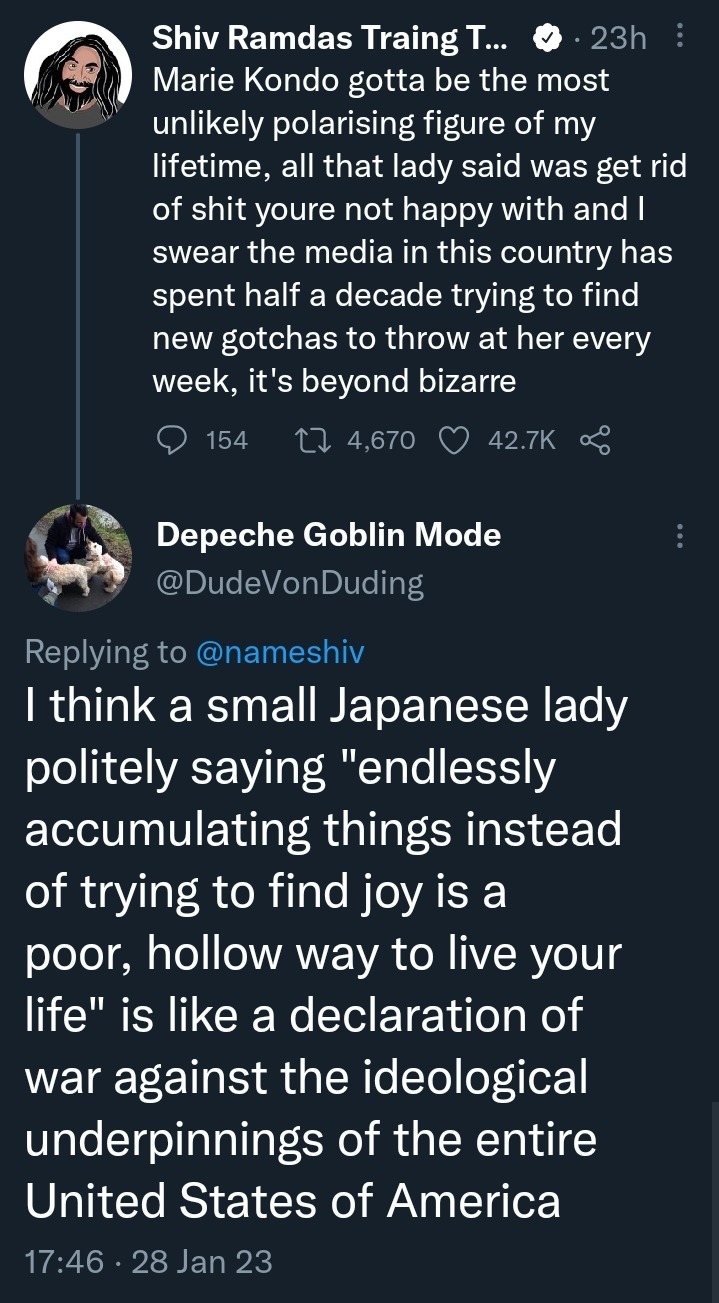
#I really like her#but come on#she got backlash because she's female and Japanese and women liked her#she's not a martyr in the war on capitalism
46K notes
·
View notes
Text
Trafalgar Law and Faith
Pre-emptive warning this is going to be another LONG metapost/analysis. There’s a lot I could talk about here but for the sake of structure I’m going to split this into three sections, i.e. the main ‘faith transitions’ that Law has gone through in the narrative thus far: 1. Flevance (catalyst for loss of religious faith), 2. Corasan (martyr that figuratively and literally saves law by giving him something to live for, introducing the will of D.), and 3. Luffy (cementing faith in this new belief system and regaining trust in the goodness of humanity through the living embodiment of everything Corasan believed in).
Before we get into all that though, let’s establish that Christianity is a thing in one piece. Speedrunning through some visual examples that come to mind; the Flevance church and nun (holding a celtic cross - censored in the anime version), a nun literally praying to God right before Marineford, Vinsmoke Sora’s grave marked with a cross (is op Christianity a northern thing?), Usopp and Chopper having crucifixes and holy water whenever ghostly stuff is brought up, Kuma and his trusty bible, the religious symbols on Kikoku’s hilt (could instead be more a reference to the Red Cross/symbol of humanitarian and medical aid as a doctor) and especially in whatever Mihawk’s got going on (though this could just be a Japanese cultural thing with Christianity being a minority religion or Oda just finding that some of the iconography, y’know. looks cool). There are also many other references to other religions e.g. hinduism, shintoism, buddhism, etc. Whether op forms of religion are the same as the real-world ones is debatable, and yes, Law being canonically raised as a devout catholic schoolboy with all the religious trauma associated with that is comical, but let’s take it all unironically for a hot minute. For fun.
1. Flevance
Law’s birthplace (Flevance) is described as being, at one point, “a very wealthy country with an unearthly beauty about it, with pure white soil and plants, like some kind of snow kingdom in a fairy tale.” The country’s wealth came from the very bedrock it sits on — white lead, which could be used to make various high quality products like tableware, cosmetics, weapons etc. When the wider world heard about this everyone wanted a piece of Flevance (the World Government also getting involved with distribution), and very quickly white lead became a “bottomless well of money”. So, hooray. Law gets to grow up in a rich city in a big house with educated doctor parents and probably gets to go to private school on weekdays and festivals with his family on weekends. One problem. In their greed, the Government and royalty have been knowingly hiding the truth about this supposed goldmine from the beginning. White lead is a toxic poison. Mining it from the ground over the last century and putting it in so many everyday products has resulted in it accumulating in the citizens’ bodies and leading to amber lead sickness, shortening their life-span with each successive generation – with the children of Law’s generation fated to die out before they reach adulthood.
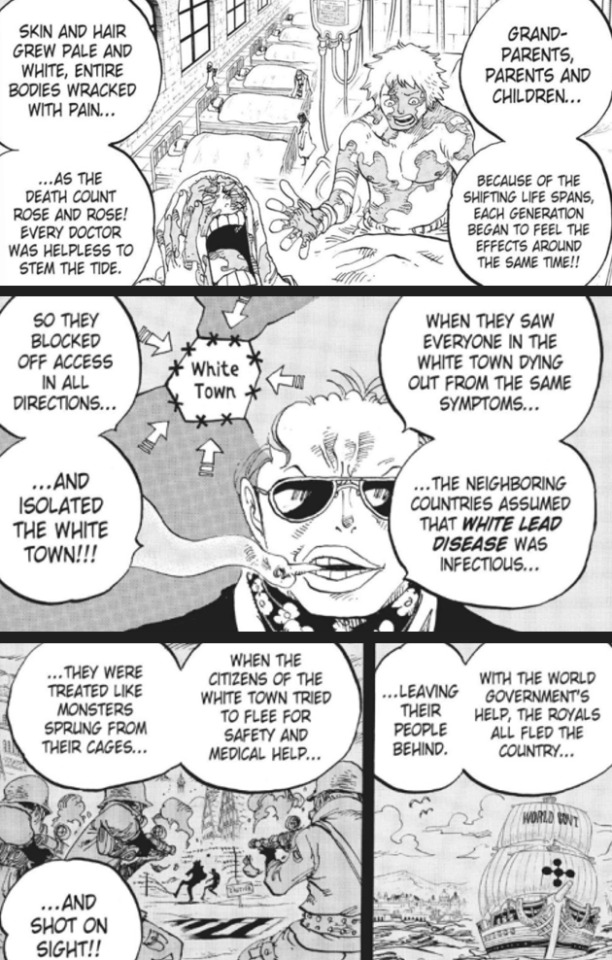
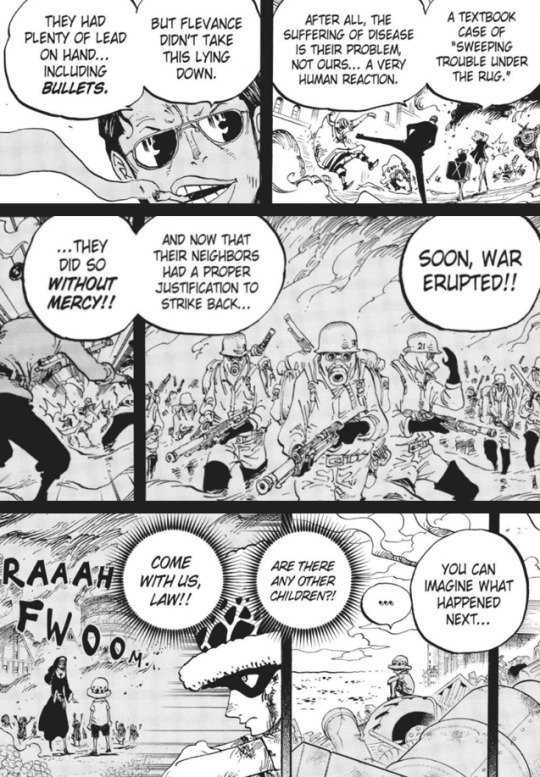
In the bible (especially in the old testament), God often inflicted these insanely disastrous events upon humanity, usually as some kind of punishment for their wrongdoings or as a test of their faith. Some events of which include (but are not limited to): famine, outbreaks of disease and natural disasters (e.g. hail, wildfire, earthquakes, floods). Historically, these stories played a key role in how humanity interpreted meaning from horrible disasters (e.g. assuming bubonic plague was sent as a punishment by god). Fire imagery is very common among these disasters as a representation for hell, which is clearly reflected in the destruction of Flevance.
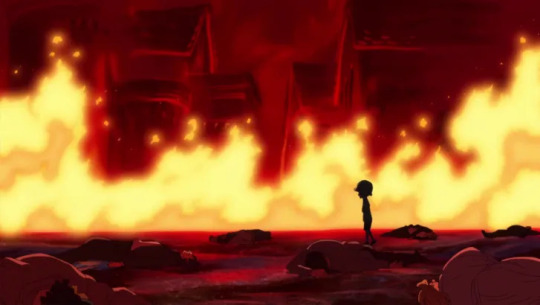

Sometimes these disasters had sole survivors act as messengers for God. With that context, let’s put ourselves back in the shoes of a ten-year old Law. Raised religious, freshly traumatised from losing his home, his devout family, all the comforts of his life, and having the outside world completely abandon him, this kind of event is likely going to be processed as some form of divine punishment. Law stumbles through hell, finds all his dead classmates, and the last words of sister nun echo through to him here. Merciful and salvation are huge catholic buzzwords – promises of holy compassion, deliverance and hope – and all of it fire and smoke and riddled with bullet holes before him. A genocide funded, perpetuated and covered up by the same body Law was promised was there to save them. And the only reason Law hadn’t died with them was because he wanted to stay with his little sister Lami, who was on her deathbed, and his parents, who were themselves trying to help the afflicted citizens, Law’s own father (before he was shot and killed alongside his mother) begging for more doctors, fresh blood, anything the world can offer, and asking “Why doesn’t the government announce to everyone that white lead is not infectious?”
Oftentimes (and in the case of Law), when there’s a promise of heavenly intervention or some miracle that doesn’t follow through, it results in an ultimate feeling of betrayal and anger. Unfortunately a lot of Catholic teachings also use a lot of guilt, essentially teaching people that the bad things that happen to you are your fault and there needs to be some sort of penance (queue Law’s survivor’s guilt that carries on down the road). But also, if this was supposed to be some divine punishment, for what exactly? For the town being blinded by the incredible wealth they were sitting on? Being lied to? Continuing to extract their livelihood, ignorant of its dangers? Punishment for who? His parents? His innocent little sister? For ten year-old Law? These people who believed in God, who were good people? That’s fucking stupid. None of these people suffered and died for any reason at all — certainly not for a sacred one. God hadn’t saved a single one of them. Law had to crawl out of hell himself by sneaking over the border under a mound of corpses.
Given everything that happened here, Law has every reason to fall into nihilism, and you can see how his upbringing would’ve bred a lot of the feelings of guilt, anger and resentment that you still see in Law (which would suggest that though this is where he likely cuts ties with the religious/Catholic component of his faith, growing up with these teachings in his formative years would definitely influence underlying beliefs about how the world works, and how Law behaves and subconsciously processes information), but at the same time, there’s usually some form of redemption and changes to how these patterns of behaviour can be approached later down the line.
2. Corasan
Fresh off witnessing his whole world burning down around him, Law meets Corazon at the very bottom of this pit of self-destructive rage and unprocessed grief. Rosinante himself mentions to Sengoku that the hatred in Law at this time reminded him of his brother, but beyond the anger, harsh pessimism, vengefulness, I think you have to reach to find similarities between them. You can see some fragments of Doffy in Law down the line at times, with Law seeming to enjoy violence (especially against the navy, but given what they did to Flevance, it’s some well-deserved retribution for Law imo), but I’m not so sure it’s the cruelty so much as it is the high he gets off his own flavour of justice. Doctor’s Hippocratic oath maybe, but never once does Law like seeing others die (even at this point, he’s in tears next to a dead body, even though he’s the one holding the knife), and later on in Wano he makes it explicitly clear to Zoro that he’d rather see the mission fail than have any of them end up dead.
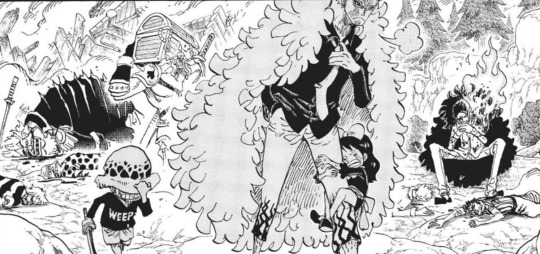
Little Law wanted to destroy the world and everything in it, but thinking rationally, what other choice did this kid have? He had no remaining family, was doomed to die before he hit puberty due to a terminal illness, was perceived as an infectious subhuman that most doctors would’ve sooner tried to exterminate than help. To Law, the world had turned its back on him – considering him a monster for simply surviving. He has all this hatred and pain boiling away with him with no tangible target to direct it towards. And this is the first clear cut rejection of faith that we see in Law. Any concept of a merciful God had just died. What God would allow this? Why is Law alive (a question that he repeats to himself throughout his life), why are these scumbags alive, why is the world going on spinning as if nothing has happened when his whole world had gone up in flames, why does anyone at all get to be here when everything I loved is gone? And it’s far easier to fall into a despondent nihilistic stupor than it is to work through any of that, and what’s the point in trying to process and move on from it, when there’s no hope for a future for Law anyway? When the only thing waiting ahead is more pain? What was this, if not a punishment? He’s supposed to be some messenger for God? How about fuck God, or whatever entity that exists that made him suffer this. Law’s not going to be a messenger for shit, thanks, he’d rather be their monster, he’d rather watch the world burn.
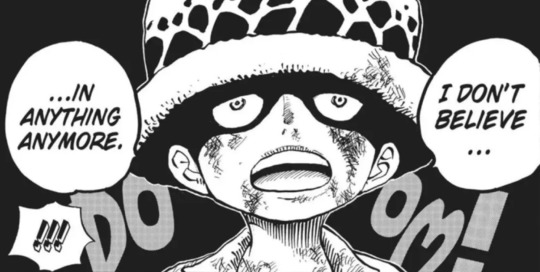
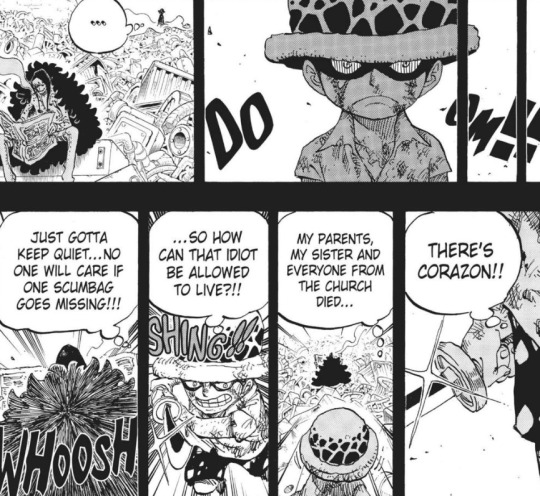
Corazon survives Law’s stabbing and doesn’t rat the little shit out (to Law’s confusion). It’s business as usual for another two years, then, one day Rosinante overhears his true name - Trafalgar “D” Water Law, and everything changes. On the back of his own beliefs, Rosinante dedicates himself to making sure Law a) lives and b) doesn’t become his brother. Law’s relatively short six month stint with Corasan forms the basis of Law’s new creed going forward, and all it took was a bit of kindness, love and humanity when the rest of the world had abandoned him. In the end Rosinante doesn’t save Law for the will of D. and the storm he’s predicted to bring in the future (as Law suspects), but he certainly believes in it, and the strength of Corasan’s conviction transfers right over to Law when he forces the ope ope fruit down the kid’s throat to heal him, tells Law he loves him, then sacrifices himself to set Law free.



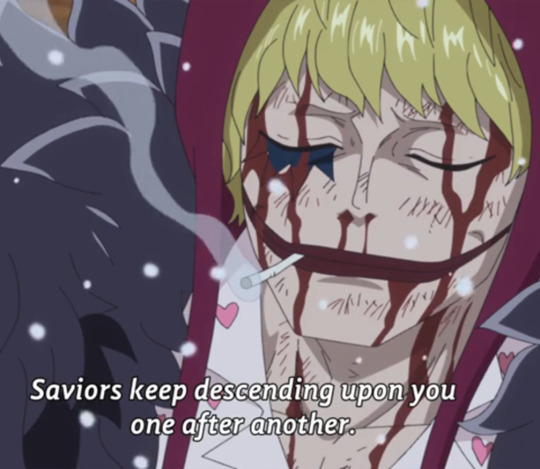
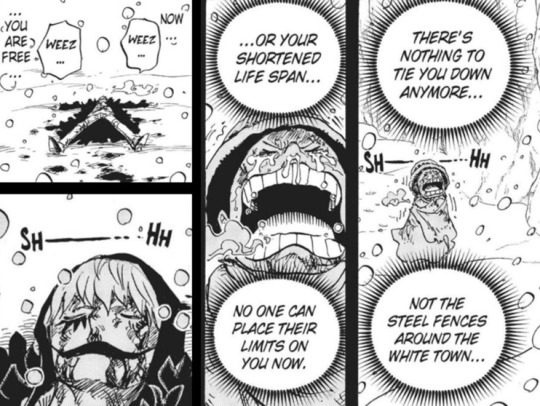
Law clings to that love he was given, he takes all these fundamental teachings and ways of thinking in regards to faith that were drilled into him during his youth, rejects the religion element and applies just about everything else to Corasan. He holds onto the last shreds of what Corasan leaves him with. Corasan becomes his “benefactor” (he gave my my heart), his saviour, his martyr.
And the crazy thing is, Rosinante was never really this saint Law makes him out to be. Law hated the clutz when they first met (mostly on account of Corazon throwing him through a glass window down at least two stories and into a pile of scrap). Corazon initially showed nothing but contempt for his presence (to ward him and the other children away from the Donquixote family, but these are still extreme measures). And it wasn’t until after learning Law’s name that Rosinante dragged him kicking, crying and screaming from hospital to burning hospital (not very saintlike in of itself), even after Law begged him to stop. Rosinante became Law’s saviour partly because of his belief in the will of D., and probably due to some guilt being a Donquixote, but mostly because he has always had a bleeding heart and he pitied (and had very quickly come to love) this angry, sick, deeply lost little kid. All this to say that Law’s faith in Corasan – this saintlike figure Law upholds him as in the future and the lengths he’s willing to go to avenge him/fulfil Rosinante’s purpose reflects the strength of the absolute beliefs Law would’ve been raised with in regards to God.
Whether it be out of survivor’s guilt (just one more body to heap on top of the Flevance pile), his love for Corasan, or for the sake of taking vengeance on the man that took away the one good thing he’d been able to regain in his miserable life, Law adopts Corasan’s will, the will of D. (which in of itself seems divine in nature), incorporates it into his new belief system, actively takes on the role of the divine punisher/justiciar and dedicates his life to bringing down Doflamingo.
3. Luffy
Catholicism dictates that the entirety of someone’s beliefs should be dedicated to one true cause (that cause being God) and expects people to ride on that, letting it carry them through life, give them hope, purpose, etc. But a lot of former Catholics choose instead to find that through something else. Corasan ignited the spark in Law’s faith around the will of D., but it’s not until he meets Luffy that this really becomes something that feels tangible and real for Law.
When Law saved Luffy in Marineford (putting the heart crew in danger for a stranger he met once), he said he did so “on a whim”, but that seems incredibly ooc for Law — this man that pretty much planned out how the rest of his life would go after the dust of Corasan’s death settled and he came to terms with the fact he wasn’t going to die at age thirteen like he’d originally thought. Circling back to the concept of Law being a sole survivor/messenger for God, it is interesting that Law is the one to seek out Luffy (given that Luffy is usually always the one either being abandoned by people or recruiting his crewmates), and Law is ultimately the catalyst for pulling him towards Dressrosa and Wano. There must be a REASON that led to Law deciding Luffy to be the most viable option out of the Worst Generation for an alliance (beyond blind trust in an unhinged captain that just so happens to also bear the initial D, and Luffy being one of the few captains crazy enough to go along with what Law was cooking up).
Law undoubtedly would’ve kept a peripheral eye on Luffy for some time before officially meeting him due to him being a rising competitor pirate and another “D” (I imagine the news of his utterly insane exploits would’ve made good reading material, too). The first time Law lays eyes on Luffy in Sabaody though, he still blows all expectations out of the water — crashing headfirst into the crowd of a slave auction and immediately committing a felony against a member of the most powerful upper one percent.
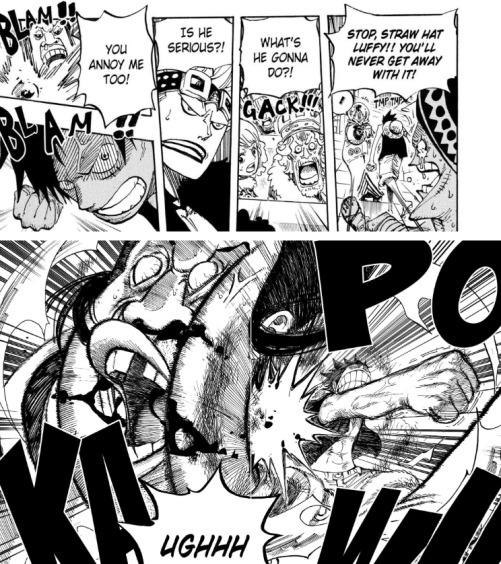

The world nobles are at an “untouchable God” tier in terms of class standing and believe it’s only natural for them to be entitled to whatever and whoever they want in this world that’s beneath them – the same kind of self-aggrandizing false divinity that Law has a a lot of repressed rage towards and that the will of D. is fated to oppose, so this, understandably, is a highly compelling first encounter, but it’s really only an initiating factor for what ultimately draws Law to Luffy. From their very first meeting (and probably before then, in the news stories and rumours Law likely picked up on), it’s made abundantly clear that Luffy does what he wants without a second’s hesitation, no matter the consequences, simply because he feels it is the right thing to do. Some call this an iron will, Law would be more inclined to call it willful stupidity and trouble, but time after time Luffy somehow manages to pull off what Law would best describe as “miracles”. And Law believes the straw hats just might be the ones to drum up another one for him.
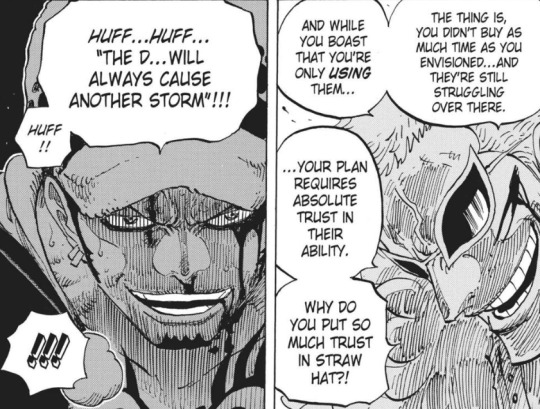
Luffy’s also got a lot of passing resemblances to Corasan going for him, e.g. inherently kind, compassionate liberators with big dumb hearts and wide goofy smiles in spite of everything they’ve been through, treating Law as nakama and saving his life despite his protests etc. All of which I’m sure Law hasn’t been completely unaffected by despite the high walls he puts up. And the more Law learned about Luffy the more it probably became clear that he is the antithesis to Doflamingo, i.e. what makes Luffy so goddamn dangerous and terrifying beyond his physical power is his ability to make friends with a simple kind of unconditional love that gets reciprocated enough so that these friends are willing to die for him.
Luffy agrees to the alliance, they successfully blow up Caesar’s base, and head off to Dressrosa. Now’s the time I should bring up that it’s taught in Catholicism that self sacrifice is the ultimate heavenly deed, and here Law is undoubtedly prepared to be a martyr for his cause. Law sends away his crew to Zou before Punk Hazard with the expectations that he’d never see them. He cultivates a fierce emotional detachment against Luffy’s willingness to bring him into the fold of the straw hats, and is resolute in that when the time comes, he will handle this himself, he will carry out Corasan’s will, and if he has to die for it, he will die with Corazon’s name plastered on his back. (Note here that Christianity is contradictory in that Law being this ready to die here is a sin, because revenge and suicide are highly discouraged, so you could say that by avenging and dying for his saviour, Law would be committing both the ultimate sacrifice and the ultimate sin).
Things get very dicey for Law in Dressrosa, to put it lightly. Doflamingo reveals that he was a celestial dragon (linking back into the will of D. “enemy of the Gods” notion), puts Law on the backfoot and gives him a thorough beating before shooting Law with a couple dozen white lead bullets in front of Luffy (because even when he’s winning Doffy loves to be a cunt about it). By the time Doflamingo is cuffing Law to the heart seat, it’s all looking pretty grim, and it’s very apparent when Luffy shows up to save him, that he is ready to die.

Law here has given up. He spent years planning his revenge for Corasan, but he lost, and he has very little left in the tank (physically, emotionally, spiritually). But Luffy doesn’t listen. Luffy who doesn’t think, doesn’t care, who trampled all over Law’s carefully laid out plan from the get-go and who is willing to take on Doflamingo single handedly for the simple slight that he dared to harm Luffy’s friend Law. Law will never find peace in his own demise because Luffy doesn’t do peaceful. He does loud and unashamed and open with no rhyme or reason other than the excruciatingly simply fact that he loves people and he thinks the people he loves deserve to have good lives. Luffy chucks Law over his shoulder and drags an injured Law across the city despite his protests (sound familiar?) and in the process inspires the fighting spirit in Law again.
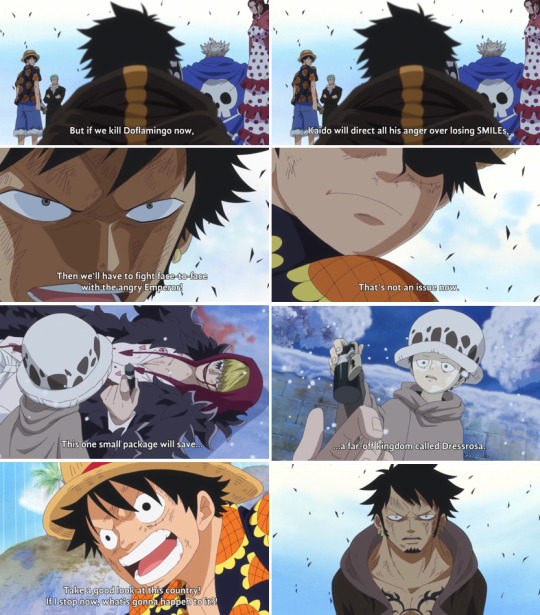
When Law confronts Doflamingo again with Luffy in tow, Law’s faith in Luffy confounds him. The last Doflamingo remembers of Law is this beautifully moldable dark pit of grief and rage who’d given up on believing, period – who wanted the world destroyed. Not so long ago, Law had been a candidate for Doflamingo’s next protégé. Now?
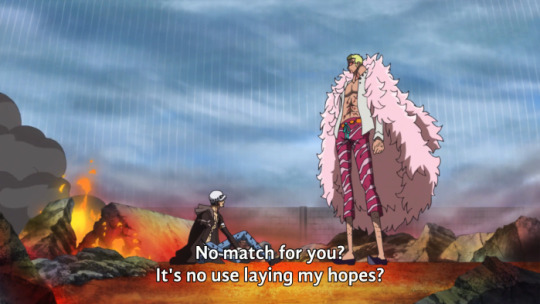
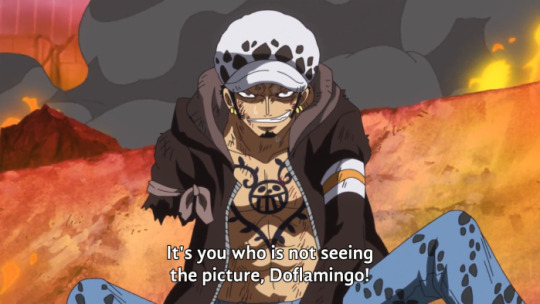

THIS is the action (grinning, staring down the barrel of a gun, flipping Doffy off as he tells him in not so many words that he may kill Law but he will never beat Luffy), Law’s unshakeable faith in the face of his own death is what has Doflamingo realising he will never regain control of Law again – is what incites Doflamingo to go from breaking Law down so he can build him back up again, to conceding defeat and outright killing him.
The trust that Luffy inspires in Law and the way he talks about Luffy (Luffy being this powerful, miracle-inducing liberator that Law can’t comprehend but follows anyway, Law laying down his hopes on him, weaponizing the will of D. to try and provoke fear from Doffy), is very reminiscent of the awe and faith talked about in scripture. Law discovers the feelings of comfort and hope that Catholicism was supposed to give him in Luffy, but Law’s belief in Luffy is a direct rejection of those teachings. Rejection by believing in a real life person as opposed to the divinity he was taught about. He’s also cementing his belief in the will of D., thus rejecting Doflamingo and all the people that embody the sort of “all powerful” divinity that he abhors (i.e. celestial dragons, Kaido, the Gorōsei/five elders) for the embodiment of hope and humanity.

When Law survives (again), he expresses he’d rather see Luffy beat Doflamingo with his own eyes or die with Luffy if he loses than leave. Then he watches, after all this talk of miracles, looking up in reverence as Luffy delivers, bright as the sun, haloed by the bars of a cage that’s haunted him for over a decade, Corasan’s words echoing at the back of his mind. God had never saved or freed Law, but Corasan was there for him, the heart crew was there, Luffy was there. And this is Law’s biggest, clearest rejection of religion – this newfound faith in humanity.
This faith in Luffy is put to the test again in Wano when Luffy is struck down by Kaido, but Law never truly stops believing that he’ll make a comeback. Even when the straw hats doubt whether he’s alive or not, something tells him Luffy’s not dead, and he holds onto that hope.
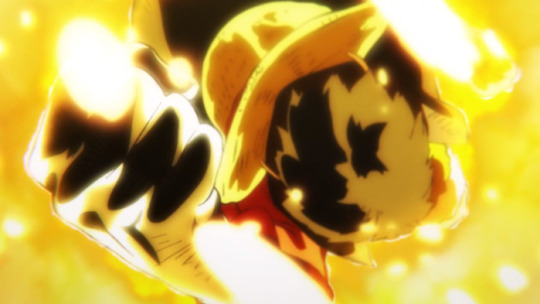


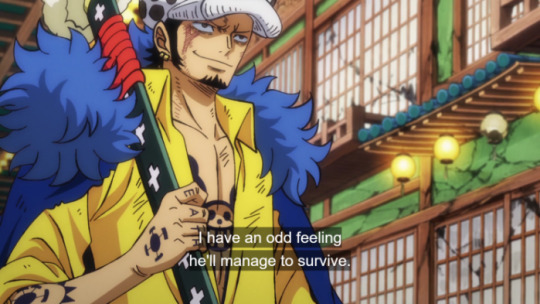
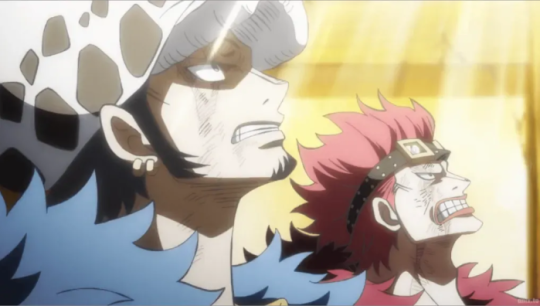
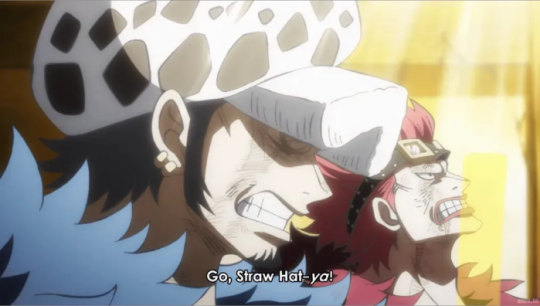
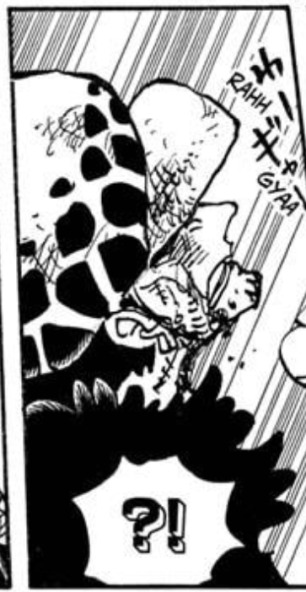

We also have the whole nika/joyboy backstory which really only reinforces all of this imagery/god-fearing looks of awe from Law and this idea of Luffy who is this perfect juxtaposition of empathetic and kind to incredibly fearsome fire and brimstone fighter. And regardless of whether you’re into the ship or not this is the impetus of Law’s relationship with Luffy for me, because here’s Luffy who has every right to have a chip on his shoulder and be downtrodden about all the injustices against him, here’s this little guy who against all odds, in the darkest of places, embodies light and hope and kindness and proves to Law that there will be hard times but there IS a happy ending at the end of the tunnel, despite it all. And everytime Luffy rises to the insurmountable challenge and wins, it just further cements that the will of D. is alive, that Corasan was right, that there's something redeemable in Law, a reason why he was worth saving, even if Law doesn’t understand it quite yet.
#merry christmas law religious trauma be upon ye#what’s an endearing idiot to a non-believer#long post#favourite character thesis statement. or something#ive been wanting to talk about this for a while but just been gathering my thoughts#will preface all this by saying I was not born or raised religious but the concept’s all very compelling from an outsider’s perspective#but I have had conversations about this to people like lesbianluffy who *were* raised catholic and relate to this experience#who I have to thank a lot for helping me wrap my head around this#this is a compilation of thoughts and conversations over the last two or so months#one piece#op#CJ's op watch-through#trafalgar law#monkey d. luffy#donquixote rosinante#donquixote corazon#monkey d luffy#lawlu#trafalgar d water law#gear 5 luffy#sun god nika#wano spoilers#lulaw#op meta#op analysis#one piece analysis
410 notes
·
View notes
Text
Homicipher Theory
Mr. Crawling: The Persecuted Martyr

(Keep in mind that we’re given very minimal information on any of the characters in game, so this is all speculation/theorizing/headcanon. In fact, this entire theory could be a result of mere coincidence, but the parallels were too exciting for me not to adopt this as my personal theory for who Mr. Crawling was.)
If we look at the game through a simplistic lens, Mr. Crawling honestly seems like a riff on malevolent Japanese entities from 2000’s horror movies. The Ring, Grudge… I mean, look at him. The long black hair, always crawling up out of holes, the random room down the hall from where we meet him which has a magical and demonic TV. He really could be (and in all likelihood) is simply an entity inspired by those modern horror tropes.

But, if we get creative and look beyond the obvious, we could run into some fascinating possibilities.
I’ve previously stated that I think the Ghost Apartments exist on haunted grounds that have been there for centuries, dating as far back as the Edo period. I think that the two ghosts most likely from this era of feudal Japan are Mr. Hood and Mr. Crawling. I’ve theorized in another post that Mr. Hood died as a dishonored samurai, committing seppuku after some act of treason.
As for Mr. Crawling? I theorize that he was a Christian martyr during the Edo period, an era of intense Christian persecution throughout Japan.
Hear me out. I know, I know, religious persecution topics in my horror game safe space = blech. There’s also no religious iconography in the game, so again, totally off the wall theory here but you might like the idea of it!
What do we know for certain about Mr. Crawling?
1) He wears what appears to be a layer of a tattered yukata. This doesn’t necessarily mean that he must have been from feudal Japan, as people in Japan do still wear traditional yukata and kimono for some events. But let’s say that his yukata does indicate that he’s from that era.

2) He has extremely long, black hair. This is rather uncommon in modern Japan for men. Long hair is seen as unprofessional, so you’re not likely to run into many men with luscious silky hair that runs to their knees. Longer hair on men was more common back in the Edo era, though, take this with a grain of salt as well, as these styles often involved shaving parts of the head. Hair like Mr. Crawling’s actually would have had more similarity with Chinese men of the era, who could have very long hair which was traditionally worn up.
The fact that his hair is black rather than gray/silver indicates to me that he is a Resident ghost. In my last theory, I suggested that there are three major types of entities in the Ghost Apartments, most distinguishable by their hair and capacity for change. Visitor ghosts (ghosts of people who wandered into the haunted world) have gray and dulling hair, whereas Resident ghosts died on the haunted grounds and retain their hair color.
3) He has no eyes or eyes that cannot see, as well as what appears to be damaged, possibly burned, skin across his eyes and forehead.

4) He cannot walk. Though, this isn’t entirely true. There is one ending we can get where Mr. Crawling does rise to his feet in defense of us, but that’s the only time we ever see him stand. He tells us early game that he doesn’t use his legs, he uses his arms to get around. Maybe walking isn’t easy or is painful for him.


5) He is friendly and self-sacrificing. There is no ghost in the game as friendly, forgiving, self-sacrificing, loyal, or loving as Mr. Crawling.

With all of these traits in mind, let’s now take a look at Ana-tsurushi.
Ana-tsurushi: A Horrible Torture
At this time in history, to be Christian in Japan was a death sentence. The persecution of Christians was violent and unrelenting. Torture was often used in an effort to force Christians to renounce their faith. Interestingly, most of these forms of torture involved the legs being bound or damaged. Burning at the stake was done with tied legs, one method of torture included tying weights to both legs while the victim sat on an iron horse. Another, specifically for women, was for them to crawl on their hands and knees through town naked.
And then there’s Ana-tsurushi.
This method of torture was particularly cruel. A deep pit was dug and usually had excrement lining the bottom of it. A metal frame was set over the pit, and then the Christian was tied by the legs upside down over the pit. A gash was carved on their forehead, and they were lowered into the pit and then boarded inside of it. They hung like that for days, being drawn up out of the pit whenever they passed out and given an opportunity to renounce their faith. If they did not, it was back into the pit, dangling upside down and bleeding in the darkness.

Picture it. A living Mr. Crawling, devoted to the wrong faith at the wrong time. But a man so steadfast in his devotion to that faith, that he refused to renounce it, even after days of horrific torture. Even after blood filled his eyes and then dripped into his hair. Even after his legs were rendered completely unusable from days of constriction. Through all of that, he remained loyal to his faith. Until the day this torture finally killed him.
Now, we have a ghost with just as much devotion and loyalty as that man, though directed at us now. A ghost who, arguably, receives nearly as much torture from us as he did in his life. We’re in a cycle of abusing him, hitting him, abandoning him, trying to kill him. And yet, he refuses to leave us. Even if we completely ignore his presence and return to the real world, he will haunt us and wait to be with us again. Even if our body grows cold, he will not step away from our sleeping form.

So, is it a crack theory? Sure, absolutely. But does it have cool connections and fun coincidences that could explain Mr. Crawling as we know him? I think so!

58 notes
·
View notes
Text
Hori pulled a Naruto LMAO Shounen authors know that they don’t NEED to write about unjust systems and reform right???
Okay, so here's where we're at apparently
Tomura is dead
Toga is dead (or, let's just call it as it is, she committed suicide) - this is despite the fact that if she died other characters (read: heroes) should have died as well, but didn't (Bakugo and Edgeshot for example)
Dabi is presumably still in the hospital (since we didn't see a funeral), unable to move or do anything on his own
Spinner wrote his book, but where he is and how he's actually doing is unknown - presumably he still has to deal with multiple quirks that aren't his own and are tearing at his body
Compress is alive but where he currently is is unknown - he read Spinner's book (and that's it)
Kurogiri exploded?? And nobody has bothered to mention anything about him since
Twice has been dead for a while, but his murderer is not only free of charge but also the head of the HPSC (which still exists btw)
Other things:
The hero ranking system still exists
Seemingly no real changes have been made which would help victims like the LOV before they felt like they had to turn to villainy to be heard/seen/understood
Deku gets to be a hero again by the power of ~technology~ - kinda making the whole deal about him losing his quirk feel pointless
Not from this chapter, but I still feel like it's very important to point out that it's heavily implied that Rei is just gonna take care of Enji (her abuser) now and probably for the rest of time
The few good things:
Ochako bringing more focus on mental health
That was it, I have nothing else
#disappointed but not surprised#please write about something else#hmmmm something about the fallacy between hope = passiveness towards an unjust system which shounen LOVES to do#bnha#if you are going to criticize and address the system but then do nothing to resolve the issues then…what’s the point???#it makes me sad that Toga became a martyr just like what Curious wanted to do#is this a criticism of Japanese passiveness about being an outsider which is sad because Japan has a history of revolution through the youth
2K notes
·
View notes
Text
quickly putting this thought out there while i work on a longer astronaut ramble cuz i'm impatient and this feels relevant to recent conversations. SO: on the topic of light's humanity...
i think there are two key functions that light (emotionally? instinctively? intellectually?) feels that his sense of self MUST fulfill in order for him to be fully satisfied/comfortable with himself as a person. these are:
light must see himself as human, as that is a key part of what makes him Perfect (and also, Pure?)
light must see himself as something above/outside of/detached from human, as that is what allows him to be absolved of murder (if he's a god/the hand of the state/Justice incarnate, he does not have to be judged according to the same ethical rules as humans)
it is this contradiction that light Must uphold throughout the entire series following his initial two killings with the death note. he cannot allow either side to fully drop away without losing the Light that he sees as intrinsically Core to who he is and who he wants to be.
it could maybe be argued that light slowly starts to do away with point (1) as the series progresses, particularly as he loses himself in the roles of L and KIRA, but i would argue that this is not the case. even in the final confrontation with near, light still talks about himself as a person-- in part, because he believes that he needs that Humility in order to garner the respect and praise of other people. he isn't a monster like higuchi, and he isn't quite a totally normal, average person anymore either, but some level of humanity must be a part of who he is or his origins in order to make his godhood/martyr status that much more grand and righteous.
anyway, another possibly contentious point that i Do feel pretty strongly about here is the fact that light connects his supposed purity/perfection to his human side specifically. observe:

this purity point in his little explanation of who he thinks KIRA is always stands out to me because it's the one point that L disagrees with (though i always forget he just says this internally and not out loud =3=")

point is-- at least at this point in the story, light sees his Youth and Innocence as a part of what makes him Pure and Righteous. he is not so young as to be totally naive about the horrors of the world, but he is not old enough to be completely jaded and pessimistic about it either. he is neither stupid, nor petty about his killings. every action is a conscious choice, well thought out in advance in order to pursue the distinct and singular goal of worldwide salvation.
i can't help but see the parallels in the fact that this is likely how other people viewed light growing up before he got the death note-- intelligent beyond his years, in a way that surpasses even most of the adults around him, but still with the Purity of his youth, perhaps unburdened in a way, optimism not yet eroded. he's still trying to live up to the praise other people pile on him and be recognized by their standards. he has an overwhelming ego, yes-- but in a japanese social context, where humility and honoring your elders is key, where a more collectivist mindset means that an individual must be held up through the acceptance and recognition of others and not their own self-praise, he has more of a nuanced social game to play.
58 notes
·
View notes
Text
When the Red Army entered Korea in early August, 1945, heavy battles took place in the north, but the Japanese rule remained tranquil in the south, for the Russians stopped by the Yalta agreement at the 38th parallel, while the Americans came several weeks after the surrender of Japan, and ruled at first through the Japanese and then through the Japanese-appointed Korean officials and police. So naturally all of the pro-Japanese Koreans – former police and officials, landlords and stockholders in Japanese companies – fled south to the American zone. The flight of all these right-wing elements amazingly simplified North Korean politics. The Russians did not have to set up any left-wing government, assuming that they wanted one. They merely set free some ten thousand political prisoners and said, by implication; “Go home, boys, you’re free to organize.” Under Japanese rule all natural political leaders either served Japan or went to jail. With the pro-Japanese gone, the ex-jailbirds became the vindicated heroes of their home towns. They were all radicals of sorts, including many Communists. Anyone who knows what a tremendous reception was given to Tom Mooney when he was released to come home to the workers of San Francisco, may imagine the effect on the small towns and villages when ten thousand of these political martyrs came home. North Korea just naturally took a great swing leftwards, and the Russians had only to recognize “the choice of the Korean people.” People’s Committees sprang up in villages, counties, and provinces and coalesced into a provisional government under the almost legendary guerrilla leader Kim Il Sung. Farmers organized, demanded the land from the landlords and got it in twenty-one days by a government decree. (Compared to the land reforms of other countries, this sounds like a tale of Aladdin’s lamp!) Ninety per cent of all big industry – it had belonged to Japanese concerns – was handed over by the Russians “to the Korean people” and nationalized by one more decree. Trade unions organized, demanded a modern labor code, and got it without any trouble from their new government, with the eight-hour day, abolition of child labor, and social insurance all complete. Another decree made women equal with men in all spheres of activity and another expanded schools. Then general elections were held and a “democratic front” of three parties swept unopposed to power. The natural opposition had all gone south, to be sheltered – and put in power – by the Americans. This is the, reason, I think, for the almost exaggerated sense of “people’s power” that the North Koreans express. Their real class struggle is coming; it hasn’t fully hit them yet. The reactionaries all fled south, where they are bloodily suppressing strikes. In North Korea the farmers are building new houses and buying radios because they no longer pay land rent, while the workers are taking vacations in former Japanese villas. The North Koreans assume that this is just what naturally happens when once you are a “liberated land.” “They aren’t yet liberated down south,” they told me. “The Americans let those pro-Japanese traitors stay in power.”
In North Korea: First Eye-Witness Reports, Anna Louise Strong, 1949
67 notes
·
View notes
Text
Artnet: Saint Sebastian, The Gay Icon


Saint Sebastian by Guido Reni (left) and El Greco (right).
Despite Saint Sebastian’s popularity in art history, the details of his life are sparingly few. Saint Sebastian is venerated as an early Christian martyr and a saint by the Catholic and Orthodox churches and, according to fifth-century hagiography, during the Diocletian Persecution of Christians Sebastian, a member of the Praetorian Guard, was sentenced to death by the reining pagan Emperor Diocletian for espousing the teachings of Christianity.
He was tied to a tree and soldiers shot him with arrows, but according to Christian lore, Saint Sebastian miraculously survived, having been rescued and healed by Saint Irene of Rome. This scene of affliction and survival would become a popular artistic theme as early as medieval times, only growing more common in 16th- and 17th-century European painting.
Sebastian’s actual martyrdom, however, came after this initial assault. Having recovered, the saint attempted to confront the Diocletian face-to-face about his persecution of Christians. Guards clubbed the saint to death and his body was dumped into a sewer, only to be later recovered by Saint Lucy and buried in a Roman catacomb, where his remains are still today enshrined at the Basilica of St. Sebastian Outside the Walls.
Throughout the centuries, Saint Sebastian’s myth and legacy have shifted with cultural interests. During medieval times, Saint Sebastian was embraced as a patron of divine protection and culturally aligned with the god Apollo, resulting in the saint’s depiction as a beautiful and youthful young man (though often clad in armor, in keeping with his life as a soldier). With the emergence of the Black Death, however, his likeness shifted to one of a grizzled older man, more aligned with his historical age. His popularity as a protective intercessor against disease grew, however, and with it, his return to youthful attractiveness.
By the dawn of the Renaissance, artists were emulating prototypes of masculinity associated with the Greek world, and Saint Sebastian transformed into a figure of ephebic beauty—adolescent, lithe, idealized in form, and often covered only by a loin cloth. These images showed the saint, not in his actual moment of martyrdom, but in a more poetic moment of torture by arrows. Indeed, these Renaissance and Baroque depictions are rooted in the Catholic teachings about the permeability of saints’ bodies and the ecstasy experienced in their communion with the divine.
In the modern era, the popularization of Saint Sebastian as an icon in the gay community often leads back to Guido Reni’s Martyrdom of St. Sebastian (c. 1615) arguably the most famous depiction of the saint. Oscar Wilde was known to have adored the work, which is in the collection of the Palazzo Rosso, in Genoa. In fact, Wilde went so far as to adopt the pen name Sebastian while exiled in Paris during the last years of his life.


Yukio Mishima (left) and Sebastien Moura (right) as Saint Sebastian.
Reni’s painting was similarly influential to the famed 20th-century Japanese author Yukio Mishima; in Mishima’s 1949 novel Confessions of a Mask, the book’s adolescent protagonist experiences a homosexual awakening while gazing at the very same painting. The references to the saint didn’t end there—Mishima, who was himself gay, went so far as to pose as Saint Sebastian in a now-infamous photographic portrait, taken not long before the writer’s death by suicide in 1970.
In the visual arts, too, these allusions to the saint have cropped up repeatedly throughout the 20th and 21st centuries. In the 1970s, Italian artist Luigi Ontani staged a provocative photograph of Saint Sebastian as a gay icon. In the 1976 film Sebastiane, filmmaker Derek Jarman engaged with the narrative of the saint to explore ties between sexual and spiritual ecstasy, through a specifically homoerotic lens.
But what about these depictions of Saint Sebastian so resonated with the likes of Wilde and Mishima? Many observers, including Susan Sontag, have noted that Sebastian doesn’t yell out in anguish amid his wounding but endures the torment with an expression caught between pain and pleasure. Sontag called him the “exemplary sufferer.” His head is often flung back or forward rapturously. He conceals the depth of his emotions, experiencing both torments and pleasures privately, a feeling similar to the experience of gay identity for many men in the 20th century (and often to this day).
Others have interpreted the arrows piercing the saint’s body as phallic allusions and disguised references to homosexual sex, while his rope-tied hands can be seen through the lens of sadomasochism. Perhaps most concretely, the story of Saint Sebastian paralleled the experiences and fears of the closeted gay community—when Sebastian’s concealed true (Christian) identity was revealed, he was shunned, tormented, and killed by those in power, a harrowing tale that mirrored the gay experiences of being “outed” throughout modern history.
(Full article)
#saint sebastian#katie white#history#gay history#lgbt history#lgbtq history#art#museum#homoerotic#gay#lgbt#lgbtq#lgbtqia
20 notes
·
View notes
Text
I think it's an interesting choice that they gave her those red shoes that stand out so loudly against the rest of her outfit. To me it could read as a bit of a Dorothy from Wizard of Oz thing, which might inform her character somewhat. A friendly rural girl that easily makes friends with different people without judgement, and is well suited for an adventure.
(It would also be symbolically fitting HoD's queer-coding, bc Dorothy is one of the original Queer Icons, and "Friends of Dorothy" specifically was a code phrase to refer to queer people).
But also, it honestly looks like she's wearing riding boots. That's not the outfit you would ride a horse in, but those aren't the shoes for light indoor activities either. They're not even particularly feminine for the time period. She's kind of wearing the equivalent of a floral dress with combat boots, so a somewhat tomboyish reading of her character doesn't seem very far-fetched!
Iirc, Lydie also made Juste and Maxim's friendship bracelets, but didn't make one for herself, which is also a potentially interesting insight into how she feels. Especially because that isn't necessarily how Maxim always saw things, if his insecurities were anything to go by. Or even how Juste might have seen things, given the different endings.
She's also younger than Juste and Maxim by a couple years, and the true ending always gave me the impression she's used to mediating arguments between them and breaking up fights, lol. Her sprite directly stands between them with her arms out like she's refereeing velociraptors. Which takes a lot of guts and/or trust to get directly between two heavily armed people who are also a wizard and a ninja respectively. And they listen to her!
An idea that won't leave my head is that Lydie is an excitable tomboy.
Think about it. Lydie, who in appearance is a frilly delicate girl, has two boys as her best friends. Two rough warrior boys, at that. How did she become part of the group? Surely she does more than just sitting demurely as they spar?
I like to think that Lydie is actually kind of reckless and likes to play danerous games. She's the kind of girl that would ruin her skirt climbing up trees or jumping on stones to cross a river. She causes a lot of headaches for her family, who want her to act proper, and this may be why she loves to spend time with her friends, who don't care if she is improper because they just like her as she is. I don't think she is that big of a rebel, because she still looks like someone who takes care of her appearance (the hair alone requires careful styling), so she might play coy with her family and be on her best behavior... until tempted by her besties.
Generally speaking, if I were to write Lydie, I think I'd move away from the "gentle" archetype and make her a ball of energy lol. The kind of person who is constantly fidgeting, bouncing on her feet and clapping her hands because she just can't wait to spend more time with her favorite people in the world!

I could also take this artwork as proof that she likes nature and animals. She doesn't have the innate talents of a witch or a Devil Forgemaster, sadly lol. She just tries her best even if she gets her fingers picked at or bitten.
Also, we know that after Simon's victory, the Belmonts became heroes of the land, and a whole village was built around them. Juste, most likely, didn't grow up shunned for his bloodline. But! He was still born different. Frail, pale, and with strange magic potential. While discrimination due to magic is not as intense at this point in time as it was in centuries past, it's possible Juste was surrounded by rumors, perhaps even doubted as a worthy successor of his grandfather. You know, for that nice family legacy stuff :)
The point is, I think Lydie never cared. Along with Maxim, who gets to experience for himself how strong and driven Juste is, Lydie might have been the first person to not treat Juste like the latest Belmont with all that comes with it, but as a boy worth of befriending. Lydie got to know Juste's various quirks, like his stubborness, or his fastidiousness when it comes to fashion and decor (I bet they joked that she could learn from him lol), and decided he was funny and that's how a friendship started.
Oh, and the wiki suggests that her surname hints at her ethnicity being Transylvanian Saxon or Banat Swabian. I think it's pretty cool and it could influence her in some way.
I need to think of more quirks to give to her. But I really would like to flesh her out a bit because she has potential to be interesting :>
#My best friend once drew two stick figures of me and our mutual other bestie strangling each other in my grammar workbook#While explaining to us both how exhausting we are to deal with and we should argue less for her sanity lol#This experience informs how I interpreted their group dynamic somewhat#I think Lydie's actual writing is squarely in the “girl that mainly exists to further the relationship between two men” archetype#Which has a lot of interesting commentary in other Japanese works at this point#Because while it grew out of damsel in distress and love triangle writing it's also foundational to the bl genre#(bc it's one of the *easiest* ways to smuggle homoeroticism into a plot under the guise of something straight)#So it's at a weird intersection of women being written without agency *and* frequent female fantasy#(See CLAMP works they love this trope a lot)#Lydie is uniquely lacking in characterization not just bc HoD isn't interested in her as a love interest#but bc it's also not that interested in her as a *sacrifice*. Hence her not being martyred like most characters in her archetype#She lives in most endings and is thus absent a big reason her archetype usually exists!#Which frees her from this narrative overall! But also still leaves her kinda flat and lacking in plot agency anyways#Imo the worst thing the game does is inexplicably reward Juste with her affection for completing the interior decorating sidequest#I feel like using her as arm candy for the player in particular was much more sexist than her just being out of focus
49 notes
·
View notes
Text
[번역/TRANSLATION] 임을 위한 행진곡—March for the Beloved
민중가요 [Minjung-Gayo] (South Korean protest music)
Literally translating to "people song", or, "song of the people", Minjung-Gayo refers to a kind of song that is sung by the people during protests. First beginning in the 70s and 80s with songs that had its roots in protesting Japanese colonial powers being used to protest the governments of military dictators such as Park Jeong-hee 박정희 and Jeon Doo-Hwan 전두환, Minjung-Gayo has grown to encompass not only the classics but also more recent pop songs such as Girl's Generation 소녀시대's "Into the New World 다시 만난 세계".
In this post, I introduce a classic Minjung-Gayo titled 임을 위한 행진곡 [Im-eul Wihan Haengjingok], or, March for the Beloved.
사랑도 명예도 이름도 남김 없이 한평생 나가자던 뜨거운 맹세 The passionate oath that we swore, that we would go forward our whole lives without leaving behind love, honor, or a name 동지는 간데없고 깃발만 나부껴 Our comrades are gone, and only a flag flutters 새 날이 올 때까지 흔들리지 말자 Let us not be shaken until a new day comes 세월은 흘러가도 산천은 안다 Even if the times pass, the mountains and streams will know 깨어나서 외치는 뜨거운 함성 We come to consciousness and roar a passionate cry 앞서서 나가니 산 자여 따르라 We march forward; may the living follow us 앞서서 나가니 산 자여 따르라 We march forward; may the living follow us
youtube
March for the Beloved was originally composed in 1981 for the 영혼결혼식 Yeonghon-Gyeolhonsik, or soul wedding, for activist 윤상원 Yoon Sang-won, martyred during the Gwangju Democracy Movement of 1980, and labor activist 박기순 Park Gi-sun, killed while contributing to the education of laborers. The soul wedding was a traditional act intended to unite unmarried dead and placate them (or, more accurately, give closure to surviving family). The two were married posthumously, although they knew each other while teaching night classes for laborers.
While the author of the original poem 백기완 Baek Ki-wan wrote it, novelist 황석영 Hwang Seok-yeong edited the lines and composed the music to insert it into a musical. The finished song was revealed in February 1982 during the soul wedding and was quickly distributed, settling in as a protest song representing the Gwangju Demicratic Movement.
In 1998, the original author of the poem that became March for the Beloved refused to claim copyright of the song, stating, "I do not have ownership nor copyright of this song. It's because the song has become that of all the people who wish for a new day on this land." It is with his wishes in mind that I translate and redistribute this song, hoping that it will inspire hope in at least one person who reads the lyrics.
In these turbulent times, we find ourselves being made to bear witness to history. The choice is ours; do we stand still and preserve ourselves, or do we go out and demonstrate our desire for democracy? I ask now that the international community does not turn its eyes away from the scene of struggle for democracy that is taking place in Korea.
References:
한국 민중가요, Wikipedia
임을 위한 행진곡, Wikipedia
영혼결혼식, Encyclopedia of Korean Folk Culture
Note:
I use the term "Gwangju Democratic Movement" as opposed to the official English name for the incident, "Gwangju Uprising", in order to reflect the renaming of the incident in Korean.
#korean language#translation#korean translation#korean#democracy#korea#south korea#current events#Youtube
24 notes
·
View notes
Text
4221 - series - y/n profile✧˖*°



*.·:·.✧ ✦ ✧.·:·.*
stage name; y/n
birth name; komatsu y/n
birthday; 2003/05/30
position; vocal, guitarist, songwriter, front person
nationality; japanese
height; 5'8 (172cm)
family; grandmother
*.·:·.✧ ✦ ✧.·:·.*
emoji; 🦋
colour; olive green
mbti; infj-t
zodiac; cancer
traits; passionate, reliable, empathetic, idealist, innovative, closed off
skills; playing guitar, composing, song writing, craftmanship
extra; too kind for her own good, guilt complex, biggest fear: hurting someone (especially someone close to her), love martyr, producers, writes, and composes all of 4 2 2 1 songs.
*.·:·.✧ ✦ ✧.·:·.*



*.·:·.✧ ✦ ✧.·:·.*
vibe/inspired by:
artist; wave to earth, rocco, laufey, baebadoobee, the neighbourhood, clairo, suki waterhouse, delorians, wallows, ichiko aoba
songs; seasons - wave to earth, i bet on losing dogs - mitski, your apartment - wallows, 24/7 - the neighbourhood, destroy myself for you - montell fish, something about you - eyedress
movies etc; all about lily chou-chou, one million yen girl, the promised neverland, spirited away, intouchables, shutter island, interstellar
*.·:·.✧ ✦ ✧.·:·.*
4221!Y/n face claim = Jurin (XG)
30 notes
·
View notes
Note
I have a hard to answer question how does one handle in a fanfic tog not going after shitler with Jewish!booker on the team without them coming off like assholes in regards to the human cost as well as the personal cost to booker, cause I'm drawing a blank
hi anon!
this is a super duper big large heavy question, and it's also one that might, depending on the context of your fic, have a very simple answer: the immortals are, other than their immortality, human, and therefore they can each only be in a single place at once.
they don't have superhuman strength or speed, they don't have magic, they don't have access to time-travel technology. I'm not an expert in ww2 military strategy but I'm sure allied governments looked into assassinating Hitler, and nobody managed to do it until the shitstain killed himself. the immortals are highly skilled and well-connected but not at the level of for example the agency that would go on to become the CIA, so who's to say they'd be successful in this assassination if they tried.
there's also the matter of when and for what reason the immortals might decide that killing this particular shitstain should go at the top of their to-do list. it's so easy for us to say in hindsight that a catastrophic volume of suffering could've been averted with this one person's death 10-15 years earlier than what happened in our timeline, but even with the strategic benefit of that hindsight, none of us can predict exactly what would've happened after a successful assassination in 1939, 1932, or even earlier. killing one leader doesn't ensure the movement he leads will stop with his death; someone even worse could have stepped in under the banner of a martyr.
things had gotten bad for Jews in a lot of places many times before things started getting real bad again in Germany. again, I'm not an expert, so I don't know when anyone outside of Nazi senior leadership knew anything about plans for the Holocaust — but would any of the immortals have learned about it sooner than international news media did? would they have known about it early enough that it was possible for a group of four immortals to stop? would they have believed such horrific plans if they'd seen them on paper? there's historical evidence that US officials didn't believe early reports could possibly be true.
there are photos on Copley's wall showing the immortals in Europe at several points during ww2 and there's that one panel from one of the comics of some of the boys being involved in liberating one of the camps. but we don't know details beyond that, and we don't know what the immortals were up to in the 1930s. they may have been very, very busy doing what they could to protect people from Japan's horrific war crimes of the same era, which started several years earlier than the Third Reich.
none of that is to say it would be easy for the immortals to know that the Holocaust was happening and not stop it. I'm sure it was devastating for all of them, who'd already seen so much needless painful death in their long lives, to see the ruthless mechanized efficiency of Nazi mass murder. it would be especially devastating for Booker, even without the Jewish Booker headcanon, bc his children died hating him bc he could not save them no matter how much they begged and no matter how hard he tried.
so my hope for the fic you're working on is that you'll show at least a little bit how their inability to stop these horrors weighs on the immortals. show the personal cost to Booker. do the others get why such horrors happening to his people, who are specifically being targeted because they are Jews, hurts him so badly? or does Andy make dark jokes about how God really must not exist or what did Booker do to piss him off.
does Andy make dark jokes like that bc she sees Quynh's face in every woman they rescue from the Japanese army's rape campaigns? it would have been just as impossible for the immortals alone to save every one of them as it would've been to stop the Holocaust. might their personal connections to victims thousands of miles apart in a war causing overwhelming suffering across most of the planet wear on the immortals' relationships with each other? they can only do but so much. how the hell do they choose which people to try to save?
now that I've thought about it, writing a fic where they do kill Hitler might actually be easier. you can just handwave the deeply frustrating logistical realities and make it so that conveniently killing the nightmare in charge happens to cause the whole house of nightmares to fall apart. (you can also handwave that in your new timeline non-Jews across Europe welcomed their Jewish neighbors home with open arms, when very often the opposite happened irl.)
this topic is so rich for all kinds of exploration in fic. you could end up with a long and plotty meditation on how painful it is for the immortals to have to choose between so many people who need their help. you might have only been asking for the sake of some references to this era of the past in a fic set during or after the movie where the historical timeline is set in stone, in which case I hope what I've shared here leads you to writing those passages with appropriate seriousness and care, even if it's ultimately a small part of a story mainly focused on other things.
this was hard to answer, but not intellectually, this kind of analysis is how my brain works. it just hurts my heart to think about how much my people have lost, how much pain so many people have suffered, and how much suffering is happening right now that there's so little I can do to stop. if I were immortal right now how the hell would I choose between Palestinians and Massalit people and Uyghurs and Rohingya and the multitude of Latin Americans suffering at the US border, all the Black Americans suffering systematically in US prisons, all the other people whose catastrophic suffering I don't even know about?
but I'm glad you asked bc this is such an under-considered element of TOG that's very worth the spotlight. I hope my thoughts here help you, and maybe others will see this and think about it as well.
25 notes
·
View notes